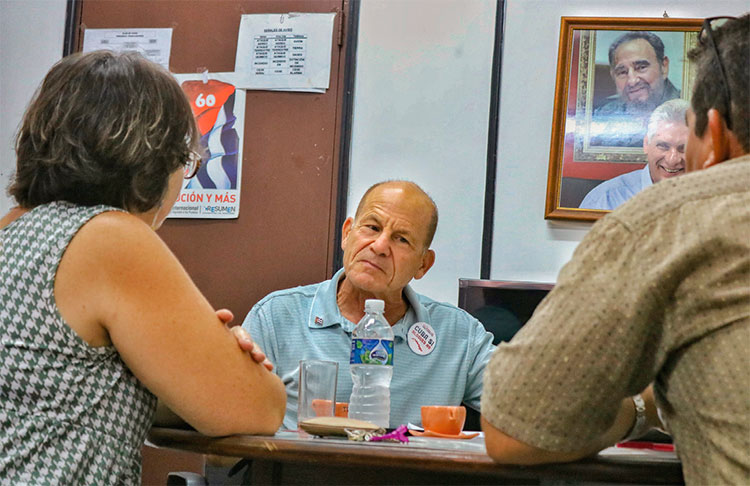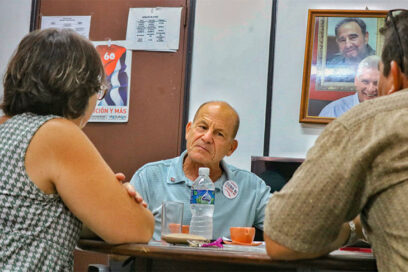Could we expect a change in the blockade after the upcoming US presidential elections? This essential question breaks the rhythm of the conversation. The veteran trade unionist looks down, as if embarrassed, and shakes his head emphatically: «I don’t think so,» he says. We already know what Donald Trump would do, strengthen it, as in his previous term… Kamala Harris, for her part, will keep Joe Biden’s line».

The dialog is with Mark Friedman, who has made the pain of the Cubans his own, and on every trip he loads his suitcases with medical supplies, medicines, and various donations to take to where they are most needed.
«Many are unaware of the reality, which is why the Los Angeles-based Hands Off Cuba Committee participates in marches, protests and strikes to explain the impact of U.S. policies, especially the blockade and its inclusion on the list of state sponsors of terrorism.»
The strategy adopted about four years ago has allowed them to be present in 20 US states and in about 40 cities: «We focus our initiatives on trade unions, because I belong to them, and in recent years we have seen a strong resurgence of the working class in the U.S. We also work with young people and university students, because we appreciate the knowledge and energy they have, in addition to allowing us to rejuvenate the movement of solidarity with Cuba.
«We have dozens of activists who have participated in the May Day activities organized by the Central de Trabajdores de Cuba, CTC, including the internship for union leaders. For 2025 we are already preparing another delegation, this time of about 70 people,» he assured.
In recent months, as a result of the work of the Committee and other organizations, some 25 resolutions in favor of Cuba have been adopted by U.S. trade unions. They strongly demand an end to the blockade and to the presence of Cuba on the spurious list linking it to terrorism.
With an attitude similar to that of this committee, there are dozens around the world. This month they are stepping up their actions in the heat of the debate scheduled for the 29th and 30th before the United Nations General Assembly, where «the most wide-ranging, complete and prolonged system of unilateral coercive economic measures ever applied against any country» will be condemned for the thirty-second time.
What Could Joe Biden Do?
With the passage of the Cuban Liberty and Democratic Solidarity Act, better known as the Helms-Burton Act, the blockade became a legal code that took power away from the executive branch and gave it to the U.S. Congress, an institution that now has in its hands the possibility of one day ending the blockade.
However, the president does have a few cards up his sleeve to play. For example, he could mitigate the damage by issuing regulatory pronouncements from the State, Treasury, and Commerce departments..
Other decisions he might make include:
- Remove Cuba from the State Department’s list of state sponsors of terrorism.
- Reversing the policy of financial persecution of Cuba, including that related to fuel shipments to the country.
- Suspend the ability to bring actions in U.S. courts against U.S. and third-country companies under Title III of the Helms-Burton Act.
- Modification of the 10% limit of U.S. components in goods that Cuba may import from any country in the world.
- Urge the Departments of State and Treasury to eliminate the inclusion of Cuban entities on other unilateral lists, such as the List of Restricted Cuban Entities, the Prohibited Persons List, and the Specially Designated Nationals List.
- Instruct U.S. representatives in international financial institutions not to block the extension of credit or other financial facilities to Cuba.
- Enable Cuban entities, including banks or companies, to open correspondent accounts in U.S. banks.
- Authorize the export of U.S. products to Cuba for key industries such as mining, tourism, and biotechnology.
- Allow U.S. importation of goods produced or derived from products grown, produced or manufactured in Cuba by state-owned enterprises (nickel, sugar, tobacco, rum, etc.).
- Allow the export to Cuba of medical supplies and equipment that can be used in the manufacture of Cuban biotechnology products.
- Relax licensing policies for U.S. companies to invest in Cuba.
- Authorize U.S. citizens to receive medical treatment in Cuba.
- Allow broader forms of cooperation for the development, commercialization and supply of Cuban-origin medicines and biomedical products, including through direct investment by U.S. companies and joint ventures.
- Allow the sale of raw materials that Cuba needs to produce medicines for the Cuban people and other developing countries.
- Authorize U.S. subsidiaries to engage in business with Cuba that is not related to the import or export of goods to Cuba (prohibited by the Torricelli Act).
Such actions are not in line with the current priorities of the U.S. government, but they are the beginning of the end of a hostility that has had the Cuban people on edge.


